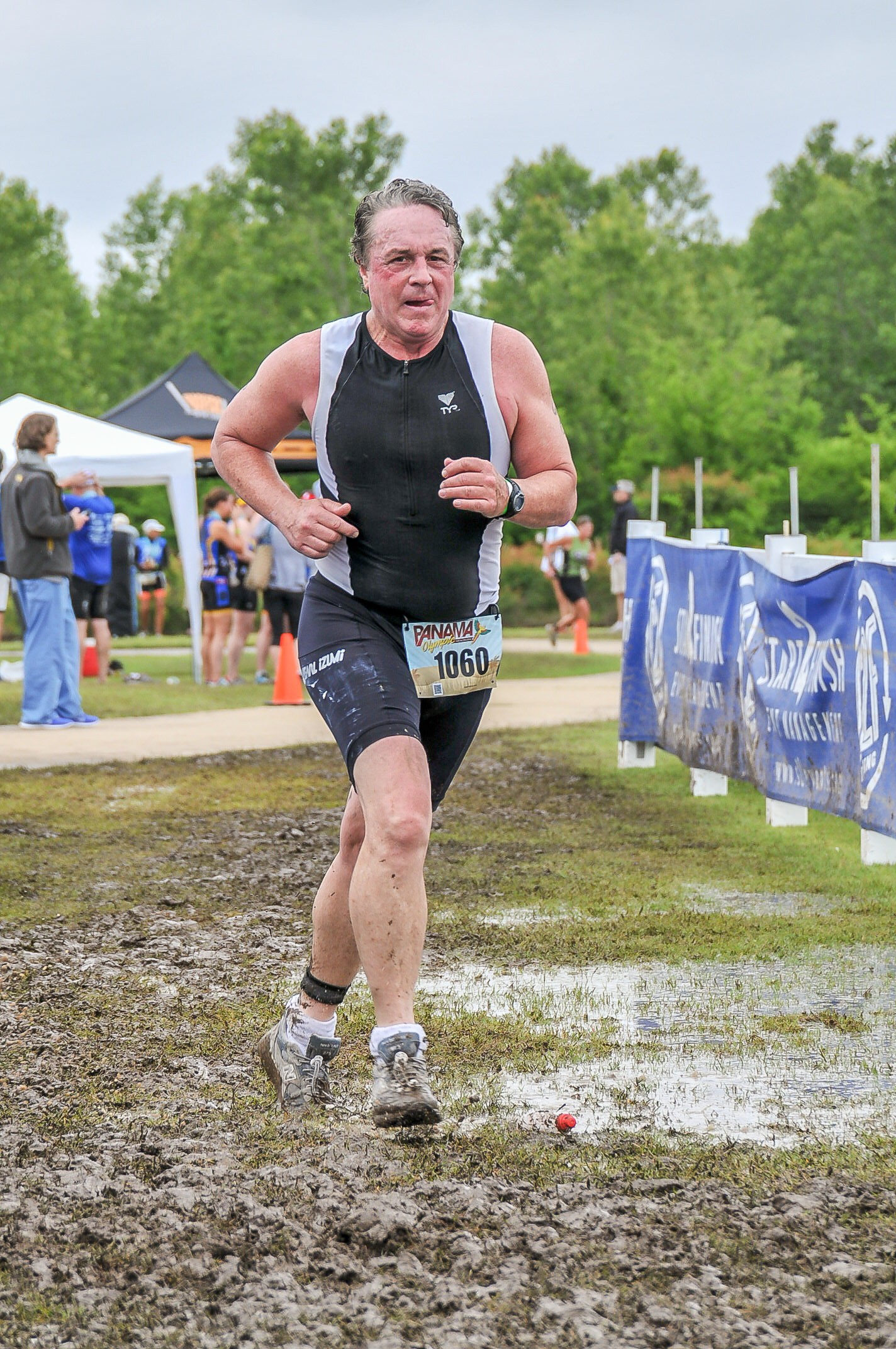 Photo courtesy Blair Ball Photography
Photo courtesy Blair Ball Photography
“It’s more difficult to get to the starting line of a triathlon than to the finish line.” So says David Sitton, and he should know. By his count, the 62-year-old Sitton has completed more than 150 triathlons since 1991 including 15 of the Ironman variety. (An Ironman consists of a 2.4-mile swim, 112-mile bike ride, and 26.2-mile run. In other words, a full marathon is merely the third act.) When Sitton enters the water this Sunday to start the Memphis in May Triathlon at Edmund Orgill Park in Millington, he’ll continue what has become a lifestyle commitment to balance. Physical balance, sure, but also of the mental and spiritual variety.
“For me, it’s about the lifestyle,” says Sitton, a graduate of Whitehaven High School (where he played baseball and football) and currently a sales rep for Barnhart Crane & Rigging. “In the NFL, NBA, even golf, you can have drug addicts [competing]. But you’re working against yourself [with that lifestyle] as a triathlete.”
Sitton took a marketing job in the early ’90s with the World Triathlon Corporation, whose new owner at the time, Dr. James Gills, convinced Sitton he should enter the Ironman World Championship in Hawaii. (Sitton originally met Gills through his work with the Fellowship of Christian Athletes.) After a short-course tune-up in March 1991, Sitton entered — and importantly, completed — that Ironman in October 1991, and with a borrowed bike. To date, Sitton has yet to receive a DNF (“did not finish”) tag. “The way I looked at it,” says Sitton, “25 percent of the field ends up in the medical tent. If you have 1,600 people enter the event, and I can at least finish ahead of the people in the medical tent, I can finish [close to] the top 1,000. I didn’t know what I was doing. I wore my bike helmet backwards for my first month of training.”
In terms of training, Sitton advocates moderation, noting that the human body starts breaking down when pushed a certain distance of miles. (Sitton describes a marathon as being “half over” at the 20-mile mark. He’s completed both the Boston Marathon and New York City Marathon multiple times.) “A lot of it is mental,” says Sitton. “When I swim [in an Ironman], I tell myself I’ve fallen out of a boat and it’s 2.4 miles to shore. It’s survival mode.” When not on the road (running or biking), Sitton trains with free weights, primarily upper body exercises. As far as the swimming component, he says few triathletes can shave much time from the opening leg. Unless you grew up swimming competitively, your swim speed today will likely be your swim speed years from now.
The rigors — and dangers — triathletes endure are not merely in competition, though Sitton has competed in triathlons in which swimmers have drowned. “It’s like an underwater boxing match,” says Sitton. “You get elbowed, heels to the head. It’s easy to come out with a nose dislocated or a chipped tooth.” Training on his bike in 2002, Sitton was hit by a car and, after refusing medical treatment at the scene, discovered he’d suffered broken ribs. After a month of rest, he completed a short-course triathlon, and later that year completed his last Ironman (in Utah). And then there are the elements. Chopping water (or waves), heat, and wind can make an already-taxing course purely torturous.
Sitton has found that training for a triathlon is a “license to eat what you want,” though again, with moderation. He does not eat after 5 p.m. the night before a triathlon, and sticks to bananas and water on race day. “The main thing is time management,” he says. “It’s real easy to talk yourself out of [a training exercise]. I don’t have a chair at work. I stand up in front of my computer. I’ll watch the news on a stationary bike.” Sitton goes to bed at 10:30 p.m. and rises at 5 a.m.
This week’s MIM Triathlon will be the 33rd-annual and marks the event’s return to Edmund Orgill Park for the first time since 2009. Athletes will swim .93 miles (1.5K), bike 24.8 miles (40K), and run 6.2 miles (10K). There will be a sprint triathlon on Saturday (1/3-mile swim, 12-mile bike ride, 3-mile run). “There are a few hills on the course,” says Sitton, “but it isn’t really challenging. Mostly just the wind. And it can get warm.”
Sitton has framed dozens of medals, including the four he received for finishing the Ironman World Championship (1991-94). But they serve primarily as a chronicle of one man’s commitment to “not being a couch potato.” Sitton takes ministry seriously and is grateful for the lives he’s been able to touch over a quarter-century of traveling as a triathlete. (A favorite passage from scripture is from the Book of Jeremiah: “ . . . let him who glories glory in this, that he understands and knows me.” [RSV])
“The triathlon is a spiritual discipline,” says Sitton. “If I can get disciplined in this area of my life, it will carry over to other areas. It keeps me balanced.”